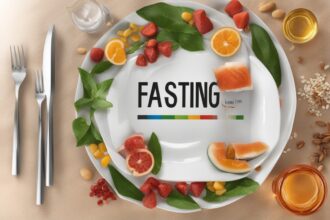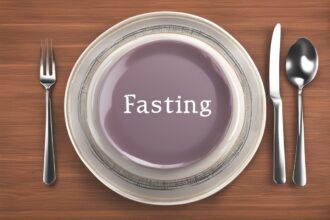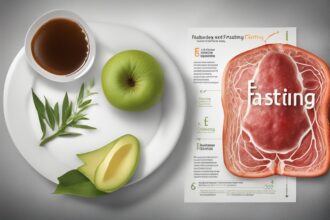Fasting has gained significant attention in recent years for its potential health benefits, ranging from weight loss to improved metabolic health. However, one of the most intriguing aspects of fasting lies in its ability to influence cellular processes, particularly in reducing cellular damage. Oxidative stress, a condition caused by an imbalance between free radicals and antioxidants in the body, is a major contributor to cellular damage and aging. In this article, we’ll explore how fasting can play a pivotal role in reducing cellular damage through fasting, delving into the science behind it and offering practical insights for incorporating fasting into your lifestyle.
What Is Oxidative Stress and Cellular Damage?
Oxidative stress occurs when there is an overproduction of reactive oxygen species (ROS), commonly known as free radicals, in the body. These unstable molecules can damage cells, proteins, and DNA, contributing to aging, inflammation, and chronic diseases such as cancer, diabetes, and cardiovascular conditions. Antioxidants, both produced by the body and obtained from food, help neutralize these free radicals. However, when the balance tips in favor of ROS, cellular damage becomes inevitable. Reducing cellular damage through fasting offers a promising approach to restoring this balance by triggering protective mechanisms within the body.
How Fasting Reduces Oxidative Stress
Fasting, the practice of abstaining from food for a specific period, induces a state of mild stress on the body, which can activate cellular repair mechanisms. During fasting, the body shifts from using glucose as its primary energy source to burning stored fats through a process called ketosis. This metabolic switch reduces the production of ROS and enhances the body’s antioxidant defenses. Studies have shown that fasting can upregulate genes responsible for producing antioxidant enzymes like superoxide dismutase (SOD) and catalase, which help neutralize free radicals. By reducing oxidative stress, fasting directly contributes to reducing cellular damage through fasting.
Moreover, fasting promotes autophagy, a cellular “clean-up” process where damaged components are broken down and recycled. This mechanism helps eliminate dysfunctional mitochondria, a primary source of ROS, further mitigating oxidative stress. If you’re interested in learning more about autophagy, check out our detailed guide on Autophagy and Fasting.
Fasting and Inflammation: A Key Connection
Chronic inflammation is closely linked to oxidative stress, as inflamed tissues produce more free radicals, exacerbating cellular damage. Fasting has been shown to reduce levels of pro-inflammatory cytokines, which are signaling molecules that drive inflammation. By lowering inflammation, fasting creates an environment where oxidative stress is less likely to spiral out of control. This dual action—reducing inflammation and oxidative stress—is a cornerstone of reducing cellular damage through fasting. For more on how fasting impacts inflammation, explore our article on Fasting and Inflammation.
Types of Fasting for Reducing Cellular Damage
Not all fasting methods are created equal, and their impact on oxidative stress can vary depending on duration and frequency. Here are some common fasting approaches that may help in reducing cellular damage through fasting:
- Intermittent Fasting (IF): This involves cycling between periods of eating and fasting, such as the 16/8 method (16 hours fasting, 8 hours eating). IF has been shown to reduce markers of oxidative stress in clinical studies.
- Prolonged Fasting: Fasting for 24–72 hours or more can trigger deeper states of ketosis and autophagy, amplifying the body’s ability to combat cellular damage.
- Time-Restricted Eating (TRE): Limiting food intake to a specific window each day (e.g., 12–6 PM) can improve metabolic health and reduce ROS production.
Choosing the right fasting method depends on your health goals and lifestyle. For beginners, starting with intermittent fasting might be the most sustainable approach. Learn more about different fasting protocols in our post on Types of Fasting.
Practical Tips for Fasting to Minimize Oxidative Stress
While fasting offers significant benefits for reducing cellular damage through fasting, it’s important to approach it mindfully to maximize results and avoid potential pitfalls. Here are some practical tips:
- Stay Hydrated: Dehydration can exacerbate oxidative stress. Drink plenty of water, herbal teas, or electrolyte solutions during fasting periods.
- Break Your Fast Wisely: Avoid high-sugar or processed foods when breaking a fast, as they can trigger a spike in ROS. Opt for nutrient-dense foods like vegetables, healthy fats, and lean proteins.
- Combine with Antioxidants: During eating windows, consume foods rich in antioxidants, such as berries, nuts, and green tea, to support your body’s defenses.
- Avoid Overdoing It: Prolonged fasting without medical supervision can lead to nutrient deficiencies or excessive stress on the body, potentially increasing oxidative stress.
For additional guidance on safe fasting practices, refer to our article on Safe Fasting Tips.
Potential Risks and Considerations
While fasting can be a powerful tool for reducing cellular damage through fasting, it’s not suitable for everyone. Individuals with certain medical conditions, such as diabetes, eating disorders, or pregnancy, should consult a healthcare provider before starting any fasting regimen. Additionally, excessive fasting or inadequate nutrition during eating periods can lead to oxidative stress rather than reduce it, as the body may struggle to maintain its antioxidant defenses. Listening to your body and seeking professional advice can help mitigate these risks. For a deeper dive into who should avoid fasting, check out our post on Fasting Contraindications.
Disclaimer: The information provided in this article is for educational purposes only and should not be considered medical advice. Fasting may not be suitable for everyone, and individual results can vary. Always consult with a healthcare professional or qualified nutritionist before starting any fasting regimen or making significant changes to your diet or lifestyle, especially if you have pre-existing health conditions or are on medication.
References
- de Cabo, R., & Mattson, M. P. (2019). Effects of Intermittent Fasting on Health, Aging, and Disease. New England Journal of Medicine.
- Mattson, M. P., & Arumugam, T. V. (2018). Hallmarks of Brain Aging: Adaptive and Pathological Modification by Metabolic States. Cell Metabolism.
- Longo, V. D., & Mattson, M. P. (2014). Fasting: Molecular Mechanisms and Clinical Applications. Ageing Research Reviews.
- Sies, H. (2015). Oxidative Stress: A Concept in Redox Biology and Medicine. Redox Biology.
- Hannibal, K. E., & Bishop, M. D. (2019). Chronic Stress, Inflammation, and the Immune System. Frontiers in Immunology.
This content is for informational purposes only and not a substitute for professional advice.






